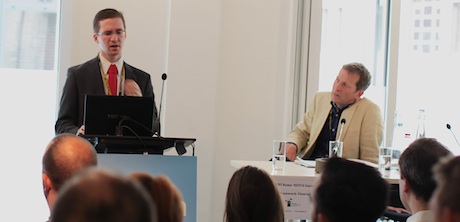Chinwag Psych Interview: David Stillwell “Be very transparent about what you predict"
New technologies are helping interpret and analyze how we behave.
One such example is myPersonality, which has attracted nearly 7.5 million people since its launch in 2007.
Developed by David Stillwell, myPersonality creates a profile from data on Facebook. It is now opening up to other academics and businesses who might benefit from adding questionnaires to the world’s most ubiquitous social network.
Stillwell says that the success of the application comes from our habit of being willing to fill in questionnaires about ourselves. “If you think about magazines, there's always some personality test that has been made up by an intern told to come up with 'which man is the best man for you?' or something like that,” he says. “That is a tradition and people like to take these tests.”
However, he's skeptical about the provenance of the tests found in magazines. While designing myPersonality, he sought to use an academic basis of proven tests and to provide clear feedback to those who take part.
“There's no way we could pay millions of people to do our research and so instead we let them read their feedback. That has a real value. These are the same kinds of tests used in business and a company might pay up to £100 to put an employee through one. Academics have these tests lying around that they would love people to take them, so it's a good synergy between the two.”
Finding yourself through the Big 5
The model for the myPersonality test is the Big 5 personality questionnaire. This includes five broad aspects of a personality.
These include openness to new ideas and experiences, people may be more liberal and creative or more conservative, flourishing in a specific routine.
There’s conscientiousness, some people are well organised and plan for the future or can be perfectionists in the extreme. At the other end of the scale people might be more spontaneous and able to cope with unexpected events.
Extroversion traditionally shows in people who like to be around others or get their energy from being the center of attention. The other side of this trait is introversion, people who are happier in individual pursuits.
Agreeableness helps to identify those who like working in teams and have an interest in the welfare of others. Alternatively it can also apply to those who are more competitive, speak their minds and are more comfortable being assertive in a debate.
Finally, emotional stability. This is reflected in the way that people may be prone to negative emotions and how they may react under pressure.
Applying this to business, Stillwell explains that an understanding of a person’s psychological make-up can help to identify a target audience.
“Typically at the moment, we can find out if someone lives in a certain postcode,” he explains. “That way you can work out their average income, if they read a particular newspaper or do certain activities.
“But this doesn’t tell you about people as individuals or the psychology of what motivates them. If you consider insurance sales, it is hard to sell demographically because everyone needs to buy insurance.
“If you look at it psychologically, you want to sell to a more organised person as they are more likely to buy insurance and they are less likely to break something.”
Tailored messages that work
 Stillwell says that this can not only help to identify a market but help to work out better ways to present your message.
Stillwell says that this can not only help to identify a market but help to work out better ways to present your message.
“If you have someone who is very emotionally stable, in order to get the message through you really have to shake them up,” he says. “Otherwise it just kind of flows over them. In an insurance context this means you have to say 'If you don’t buy our insurance, your house might burn down, you'll lose everything, bad things are coming your way’. But for someone who feels those negative emotions, that might be too much for them. People shut down if they're too stressed out. So for those who feel more anxious, you want to say to them, ‘Buy the insurance and then everything will be covered and if anything did go wrong and we'd help you out so you can forget about it’”.
So targeting and tailoring can be a lot more effective if you know who you are aiming for and what the best route is into their minds.
At Chinwag Psych, Stillwell discussed how basic Facebook information can directly predict a personality. “That's the great advantage,” he says. “If someone comes to your website and logs in with Facebook connect, you can take their data, understand them as an individual and tailor your offering to them.”
Of course not everyone on Facebook is comfortable with sharing their profile information.
“I think there is a potential trust issue, not with Facebook itself or others who hold the data - like Google,” he says. “These are massive companies and so if they did something that people didn't like then there's a big media problem.
“Some small companies could do things because they don't have anything to lose,” he continues. “Our recommendation for people using the data is that they be very transparent about what they are predicting and what they use to predict it.”
Stillwell says that being open about the use of data can indeed help a business. If potential customers are able to provide corrections when things are wrong, then this helps in future for that business to get their predictions right.
In the past we learned that the customer is ‘always right’, these days we know that the consumer has more power and choice. So what’s a business to do in order to secure a section of their market?
Certainly getting to know your customer and being able to send them a message they want to hear is a step in the right direction and Stillwell appears to have a smart way to find out exactly what those customers may be thinking.





